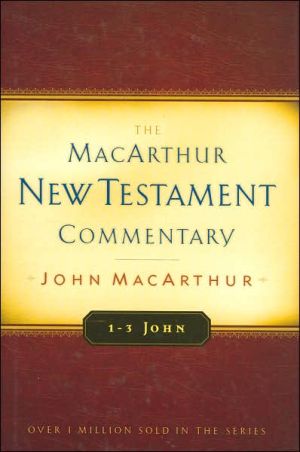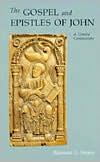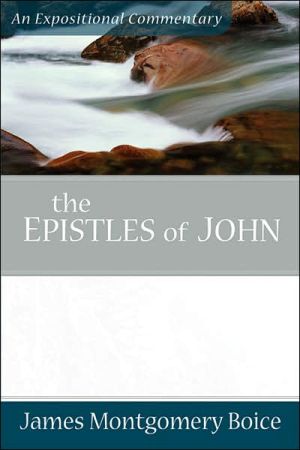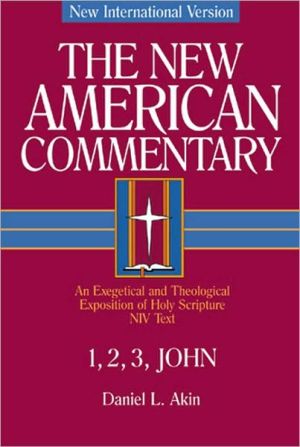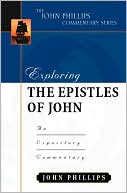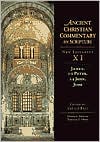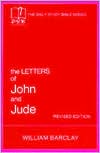MacArthur New Testament Commentary: 1-3 John
The apostle John is really a man for our times. He wrote his three New Testament letters in a bold, direct, even dogmatic style, more so perhaps than any other New Testament writer. Although renowned traditionally as the apostle of love (and he was), he was an authoritative, uncompromising teacher and an exclusive-style instructor with a crucial message of truth versus error, which the church much needs to hear in the twenty-first century.\ This commentary considers John's clear, simple,...
Search in google:
The apostle John is really a man for our time. He wrote his three New Testament letters in a bold, direct, even dogmatic manner—more so perhaps than any other New Testament writer. Although renowned traditionally as the apostle of love (and he was), he was an authoritative, uncompromising teacher—an exclusive-style instructor with a crucial message of truth versus error, a message which the twenty-fi rst century church needs to hear. Biography JOHN F. MACARTHUR, JR. pastors Grace Community Church in Sun Valley, California, and serves as President of the Master’s College and Seminary. A well-known Bible expositor and conference speaker, he has written more than six-dozen books, including the MacArthur New Testament Commentary Series and the MacArthur Study Bible. He is the Bible teacher on Grace to You, an international radio broadcast.
THE MACARTHUR NEW TESTAMENT COMMENTARY 1-3 JOHN\ \ By John MacArthur \ Moody Publishers\ Copyright © 2007 John MacArthur\ All right reserved.\ ISBN: 978-0-8024-0772-6 \ \ \ \ Chapter One\ Certainties of the Word of Life (1 John 1:1-4) \ What was from the beginning, what we have heard, what we have seen with our eyes, what we have looked at and touched with our hands, concerning the Word of Life-and the life was manifested, and we have seen and testify and proclaim to you the eternal life, which was with the Father and was manifested to us-what we have seen and heard we proclaim to you also, so that you too may have fellowship with us; and indeed our fellowship is with the Father, and with His Son Jesus Christ. These things we write, so that our joy may be made complete. (1:1-4)\ \ We live in an era that looks with suspicion on any type of certainty or conviction about the truth. Our society has abandoned the idea of absolutes, choosing instead to arbitrarily grant equal validity to every opinion and philosophical musing. Sadly, today's church, influenced by the surrounding culture, has fallen prey to an inclusivism that tolerates seemingly any and every viewpoint, except dogmatism. In the realm of biblical interpretation, for instance, a significant new movement is gaining ground that says that no one can know for sure what the Bible means. According to this emerging viewpoint, the Bible is so obscure that anyone who exegetes Scripture should offer nothing more than a cautious, "humble," open-minded opinion regarding the text's meaning. But such radical, unwarranted skepticism blatantly ignores the Bible's own teaching that Christians not only can, but must, know the truth (John 8:32; cf. Pss. 19:8; 119:105; Prov. 22:21; Isa. 29:24; Luke 1:4; 1 Tim. 4:3; 2 Peter 1:12, 19; 1 John 2:21;4:6; 2 John 1). Thus, to claim that the meaning of Scripture is unknowable is to directly attack the divinely designed clarity of the Bible; it is, in essence, to accuse God of being unable to clearly reveal Himself and His truth to humanity. The inevitable result of such arrogance-for those who embrace it-is the loss of certainty and confidence about the rich and essential doctrinal truths of the Christian faith.\ \ The writers of Scripture, on the other hand, were absolutely certain of what they believed and, under the Holy Spirit's inspiration, wrote with a clarity and boldness that makes the message of salvation in its fullness understandable to the regenerated and illuminated mind. Still, the proper sense of dogmatism is utterly contrary to today's relativistic attitudes, and those who hold it are consistently condemned as insensitive, unloving, and anti-intellectual. The reality is that those who deny Scripture's clarity are likely motivated by rebellion against its clear message of sin and righteousness (cf. John 3:20). Denying that the Bible can be understood gives false comfort to those who do not like the truth it reveals. In contrast, those who love the truth are quick to seek it out and apply it to their lives (John 3:21). Such God-honoring adherence to divine, absolute truth is precisely what the apostle John exalts in his first epistle as the evidence of genuine salvation.\ \ The teaching of this epistle may be divided into three categories: theological certainty regarding the gospel and the person of Jesus Christ (2:1-2, 22; 5:1, 20), moral certainty regarding the commandments of God (2:4, 7, 29; 3:9, 22), and relational certainty regarding love (2:10; 4:7, 21; 5:2-3). (For a complete overview of John's themes in his first letter, see the Introduction to 1 John at the beginning of this volume.)\ \ Consistent with his firm commitment to the certainty of divine truth, John dispensed with all introductory amenities-he did not even name himself as the author, nor did he identify his audience. Rather, he immediately launched into writing the Spirit-inspired truth. He began by presenting five certainties about the person and work of Christ: The Word of Life is unchangeable, historical, communicable, relational, and joyful.\ \ \ \ \ \ The Word of Life is Unchangeable\ What was from the beginning, (1:1a)\ \ The message of redemption is unchanging. From the beginning of the proclamation of the gospel it has been the same. Those who preach the true gospel have always commanded faith and repentance (Matt. 4:17; John 3:16-18; Acts 2:38; 17:30), declared that the kingdom of God is at hand (Matt. 3:2; Acts 19:8), announced the merciful and gracious availability of divine forgiveness (Acts 10:43; Eph. 1:7), and urged sinners to be reconciled to God through Jesus Christ (2 Cor. 5:18-21). When the apostle John wrote this epistle, an incipient Gnosticism was already threatening the churches of Asia Minor. Its proponents denied the full deity and humanity of Jesus Christ and, therefore, His true nature essential to the gospel. They further claimed to have attained, apart from the gospel, a transcendent knowledge of the divine, available only to the "spiritual" elite and otherwise beyond the reach of the common believer.\ \ Such false teachers threatened the church in John's day, just as they still do today; and they will continue to do so until the end of the age. Jesus warned, "For false Christs and false prophets will arise and will show great signs and wonders, so as to mislead, if possible, even the elect" (Matt. 24:24). They threaten to undermine the church (Acts 20:29-30; 2 Tim. 3:1-9), seeking to lure it away from the apostolic body of faith (cf. Acts 2:42; 13:8; 14:22; 16:5; 1 Cor. 16:13; 2 Cor. 13:5; Eph. 4:4-6; Col. 1:23; 1 Tim. 4:1,6; 6:10,21; 2 Tim. 3:8; 4:7; Titus 1:13; 3:15; 2 Peter 1:20-22; Jude 3,4,20) -the inspired truth that nothing can ever supersede (cf. Heb. 13:8-9).\ \ Any alteration of this heavenly revelation, whether by adding to it or taking from it, constitutes an attack on the truth and its sovereign Author. All preachers, teachers, and witnesses for the gospel-in any generation or location, for any reason, including making the message more acceptable or marketable-should know they cannot freely change with impunity any element of God's revelation.\ \ The apostle Paul also earlier warned in unambiguous words of those who propagate an altered or false gospel:\ \ I am amazed that you are so quickly deserting Him who called you by\ the grace of Christ, for a different gospel; which is really not another;\ only there are some who are disturbing you and want to distort the\ gospel of Christ. But even if we, or an angel from heaven, should preach\ to you a gospel contrary to what we have preached to you, he is to be\ accursed! As we have said before, so I say again now, if any man is\ preaching to you a gospel contrary to what you received, he is to be\ accursed! (Gal. 1:6-9)\ \ With a simple opening statement John establishes that the gospel message concerning the Word of Life is permanent and unalterable (cf. Rev. 22:18-19).\ \ \ \ \ \ The Word of Life Is Historical\ what we have heard, what we have seen with our eyes, what we have looked at and touched with our hands, concerning the Word of Life-and the life was manifested, (1:1b-2a)\ \ Contrary to what the false teachers taught, experiencing Christ and His gospel is not some mystical, spiritually transcendent, secret insight reserved only for those elite who ascend to some higher understanding. John told his readers-even those who were young in their faith (cf. 2:12)-that they could apprehend the actual, historical truth about the Word of Life (the person and work of Jesus Christ as proclaimed in the gospel). In his record of the life and ministry of Christ, John wrote that "the Word became flesh, and dwelt among us, and we saw His glory, glory as of the only begotten from the Father, full of grace and truth" (John 1:14; cf. Rom. 1:3; Gal. 4:4; Heb. 1:1-3; 1 Tim. 3:16; Rev. 19:13). Jesus Christ was the God-man (John 10:30), fully divine (Phil. 2:6; Col. 2:9); and fully human (Luke 1:31; Phil. 2:7-8; Heb. 2:14; 4:15). John had experienced that reality through his natural senses and was a true witness to the incarnation in its completeness.\ \ John listed four ways he had actually perceived the Word of Life with his senses. First he had heard the Lord speak. John heard the parables (e.g., Matt. 13:3-33; Mark 4:26-29; Luke 15:11-32), sermons (Matt. 4:23; 5-7), and private words of instruction and counsel from Jesus (Matt. 10:5-42; John 13:12-17; 14-16). Have heard translates a perfect tense form of the verb akouo, indicating a completed occurrence in the past with an impact in the present. John did not merely hear something from Jesus on a single occasion. He was present throughout Jesus' earthly ministry (cf. John 20:30-31; 21:24-25). Though John wrote this letter some sixty years later, what he had heard firsthand was still a vivid truth in his heart.\ \ Not only had John heard the Lord; he had also seen Him. The verb translated have seen is also in the perfect tense, again suggesting a past, completed action with a present, ongoing impact. John added with our eyes to make it clear that he was referring to the physical experience of seeing; he was not referring to some kind of spiritual vision that was only in his mind. Christ was not a mystical, phantom image, as some have alleged, but a real man whom John had observed daily for three years by means of normal eyesight.\ \ Third, reinforcing the truth that he had actually seen Jesus, John added the term looked at. That word involves more than a mere glance or quick look; instead, it denotes a long, searching gaze (cf. 4:14; Matt. 11:7; Luke 23:55). It is the same verb (theaomai) that the New King James Version translates "beheld" in John 1:14. Beyond the works that Jesus performed, John and the other apostles watched Him intently for several years and saw the stunning and unmistakable realities of who He is (cf. Matt. 13:16-17)-the Lord and God, Messiah and Savior (Luke 2:25-32; John 1:29, 41), with supernatural power over demons, disease, nature, and death (Matt. 4:23-24; 8:28-32; Mark 1:23-27; Luke 5:4-6; 7:12-15; John 2:6-10; 4:46-53; 5:5-9; 9:1-7; 11:38-45), and the authority to forgive sins (Mark 2:5, 9; Luke 7:48) and grant eternal life (Luke 19:10; John 11:24-27). As intimate and constant eyewitnesses to His earthly ministry, they had ample proof that Jesus Christ was God in human flesh (John 14:8-11).\ \ Finally, John told his readers that he had touched with his hands the Word of Life. The word rendered touched (pselaphao) means "to feel after," or "grope" (like a blind man). Jesus used the same word in Luke 24:39, "Touch Me and see, for a spirit does not have flesh and bones as you see that I have." The apostles would have touched Jesus all the time in the daily course of their companionship with Him. John even described himself as one who leaned on Jesus' chest (John 13:23, 25; 21:20). The Lord encouraged Thomas to touch Him on that postresurrection occasion, "Reach here with your finger, and see My hands; and reach here your hand and put it into My side; and do not be unbelieving, but believing" (John 20:27).\ \ With the incarnation of Jesus Christ the life was manifested. The verb translated was manifested (phaneroo) means "to reveal," or "to make visible what was hidden." God did not reveal Himself in human flesh until Christ's earthly ministry when the divine or eternal life became visible to mankind. As Jesus said, "For just as the Father has life in Himself, even so He gave to the Son also to have life in Himself" (John 5:26; cf. 1:1-4; 5:39-40; 11:25-26; 1 John 5:12). The Father and the Son have the same divine life, and both can grant eternal life (John 6:37-40).\ \ \ \ \ \ The Word of Life Is Communicable\ and we have seen and testify and proclaim to you the eternal life, which was with the Father and was manifested to us-what we have seen and heard we proclaim to you also, (1:2b-3a)\ \ For John, that which was manifested to him-the Word of Life-became the basis for his proclamation of truth. His privileged life in the presence of the Lord Christ was not a private experience to elevate him above others who were not so blessed, as if he were somehow one of God's "favorite sons." Rather, his privilege became the platform for his responsibility and mandate, as an apostle and eyewitness, to bear witness (testify) of the truth (John 20:30-31; 21:24; cf. 1:41-42; 2 Cor. 5:14-15) and proclaim the gift of eternal life in Him (cf. Ps. 145:11-12; 1 Cor. 2:2; 9:16) to those, including his readers, who had never seen Jesus. Because of his widespread reputation as one who had been with Jesus as an apostle (cf. John 1:14, 16-18, 37-51), John was a true and credible witness (John 19:35-37). Other New Testament books written by apostles or their associates also present eyewitness accounts of Jesus and the truth of the gospel. The other Gospels do that (cf. Luke 1:1-4), as does the book of Acts (cf. 1:1-3) and the epistles (e.g., 2 Peter 1:16-21).\ \ The apostle John knew that the matter of communicating the Word of Life was not an option but a command. The content of the message was not to be hoarded but its unchanging truth declared far and wide. Commenting on this passage, John R. W. Stott provided this key perspective:\ \ The historical manifestation of the Eternal Life was proclaimed, not\ monopolized. The revelation was given to the few for the many. They\ were to dispense it to the world.... He [Christ] not only manifested\ Himself to the disciples to qualify them as eyewitnesses, but gave them\ an authoritative commission as apostles to preach the gospel. The\ author [John] insists that he possess these necessary credentials.\ Possessing them, he is very bold. Having heard, seen and touched the\ Lord Jesus, he bears witness to Him. Having received a commission, he\ proclaims the gospel with authority, for the Christian message is neither\ a philosophical speculation, nor a tentative suggestion, nor a modest\ contribution to religious thought, but a dogmatic affirmation by those\ whose experience and commission qualified them to make it. (The\ Epistles of John, Tyndale New Testament Commentaries [Grand Rapids:\ Eerdmans, 1964], 61,62-63, emphases in original)\ \ \ \ \ The Word of Life Is Relational\ so that you too may have fellowship with us; and indeed our fellowship is with the Father, and with His Son Jesus Christ. (1:3b)\ \ John proclaimed the Word of Life so that (hina, "in order that") all believers would realize they have fellowship (an authentic partnership) with Jesus Christ and fellow believers (cf. Acts 1:14; 2:42,44-47; 1 Cor. 12:26-27; Eph. 4:1-3; Heb. 10:25; 12:22-24). The word rendered fellowship, the familiar Greek term koinonia, signifies a mutual participation in a common cause or shared life (cf. Gal. 2:9; 6:6; 1 Tim. 6:18; Titus 1:4; Philem. 6; 1 Peter 4:13; Jude 3). It is far more than a mere partnership of those who have the same beliefs and are thus drawn together. Rather, it is the mutual life and love of those who are one in spirit (1 Cor. 6:17; cf. Eph. 5:30-32).\ \ The aim of gospel preaching is to produce faith that rests in Christ (John 6:29; Acts 20:21). Those who believe savingly in Jesus enter into a genuine union with the Father, His Son Jesus Christ, and the Holy Spirit. The apostle Paul wrote,\ \ God is faithful, through whom you were called into fellowship with His\ Son, Jesus Christ our Lord. (1 Cor. 1:9; cf. Gal. 2:20)\ \ The grace of the Lord Jesus Christ, and the love of God, and the fellowship\ of the Holy Spirit, be with you all. (2 Cor. 13:14; cf. John 17:21)\ \ Even sinning Christians who lose the joy of their fellowship with God never lose the reality of that eternal life from Him (1 Cor. 1:9; 2 Cor. 13:14; Phil. 2:1; Heb. 12:10), given them through their union with Christ (Rom. 6:3-5; Eph. 2:5; Col. 3:2). Jesus said, "Truly, truly, I say to you, he who hears My word, and believes Him who sent Me, has eternal life, and does not come into judgment, but has passed out of death into life" (John 5:24; cf. Eph. 5:26; Titus 3:5). The new birth produces new life, so that believers are regenerated into everlasting fellowship with the triune God (cf. John 3:5-8).\ (Continues...)\ \ \ \ \ Excerpted from THE MACARTHUR NEW TESTAMENT COMMENTARY 1-3 JOHN by John MacArthur Copyright © 2007 by John MacArthur. Excerpted by permission.\ All rights reserved. No part of this excerpt may be reproduced or reprinted without permission in writing from the publisher.\ Excerpts are provided by Dial-A-Book Inc. solely for the personal use of visitors to this web site. \ \
TABLE OF CONTENTS\ Preface\ Introduction to 1 John\ 1. Certainties of the Word of Life ( 1 John 1:1-4)\ 2. Tests of Salvation - Part 1: Belief in God and the Certainty of Sin (I John 1:5-6, 8, 10)\ 3. Test of Salvation - Part 2: Belief in the Forgiveness of Sins and Confession ( 1 John 1:7, 9; 2:1a)\ 4. Jesus Christ: The Divine Defense Attorney and the Perfect Propitiation (1 John 2:1b-2)\ 5. The Certainty of Christian Assurance (1 John 2:3-6)\ 6. A New Kind of Love ( I John 2:7-11)\ 7. The Stages of Spiritual Growth ( 1 John 2:12-14)\ 8. The Love God Hates (1 John 2:15-17)\ 9. Antichrists and Christians (1 John 2:18-27)\ 10. The Purifying Hope (1 John 2:28-3:3)\ 11. The Christian's Incompatibility with Sin (1 John 3:4-10)\ 12. The Children of the Devil versus the Children of God (1 John 3:11-18)\ 13. Holy Affections (1 John 3:19-24)\ 14. Testing the Spirits (1 John 4:1-6)\ 15. Manifesting Perfect Love ( 1 John 4:7-21)\ 16. How to Recognize an Overcomer (1 John 5:1-5)\ 17. The Witness of God (1 John 5:6-12)\ 18. Christian Certainties (1 John 5:13-21)\ Introduction to 2 John\ 19. Living in the Truth (2 John 1-4)\ 20. The Limits of Love (2 John 5-13)\ Introduction to 3 John\ 21. Sacrificial Love for Those Faithful to the Truth (3 John 1-8)\ 22. The Man Who Loved the Preeminence (3 John 9-14)\ Bibliography\ Index of Greek Words\ Index of Scripture\ Index of Subjects
